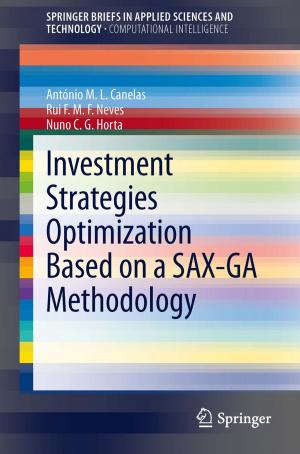Investment, R&D, and Long-Run Growth
Business & Finance, Economics, Economic Development, Finance & Investing, Finance| Author: | Dietmar Hornung | ISBN: | 9783642517181 |
| Publisher: | Springer Berlin Heidelberg | Publication: | June 29, 2013 |
| Imprint: | Springer | Language: | English |
| Author: | Dietmar Hornung |
| ISBN: | 9783642517181 |
| Publisher: | Springer Berlin Heidelberg |
| Publication: | June 29, 2013 |
| Imprint: | Springer |
| Language: | English |
In the 1990s, growth theory has incorporated imperfect competition in its investigations. This innovation has proven to be seminal: Cleviating from growth models with perfect competition, the new framework featured forward looking entrepreneurs. Firms maximize profits intertemporarily, i. e. their in vestment leads to instantaneous sunk costs and offers flows of future profits. Firms finance this investment by launching shares. The capital market is per fectly competitive, implying that the return on a share is equal to the return on a bond. As opposed to the capital market, the goods market is imperfectly competitive. As a result of investment, firms enjoy market power. That is, firms may acquire the capability to provide a product that is differentiated in, e. g. , styling, technology, accessibility, or reputation. The launch of a dif ferentiated product allows to capture a market niche, and successful firms may price above marginal cost. The resulting profit flows are channelled to the firms' shareholders. The introduction of monopolistic competition into growth theory is valuable: real world economies may be portrayed rather by such an imperfect competition framework than by a perfect competition approach. Starting with Romer (1990), in growth theory, modeling of imperfect competition has been notoriously bound to a focus on the impact of research and development (R&D) on economic growth. In the existing literature, growth-affecting investment is restricted to R&D investment.
In the 1990s, growth theory has incorporated imperfect competition in its investigations. This innovation has proven to be seminal: Cleviating from growth models with perfect competition, the new framework featured forward looking entrepreneurs. Firms maximize profits intertemporarily, i. e. their in vestment leads to instantaneous sunk costs and offers flows of future profits. Firms finance this investment by launching shares. The capital market is per fectly competitive, implying that the return on a share is equal to the return on a bond. As opposed to the capital market, the goods market is imperfectly competitive. As a result of investment, firms enjoy market power. That is, firms may acquire the capability to provide a product that is differentiated in, e. g. , styling, technology, accessibility, or reputation. The launch of a dif ferentiated product allows to capture a market niche, and successful firms may price above marginal cost. The resulting profit flows are channelled to the firms' shareholders. The introduction of monopolistic competition into growth theory is valuable: real world economies may be portrayed rather by such an imperfect competition framework than by a perfect competition approach. Starting with Romer (1990), in growth theory, modeling of imperfect competition has been notoriously bound to a focus on the impact of research and development (R&D) on economic growth. In the existing literature, growth-affecting investment is restricted to R&D investment.















